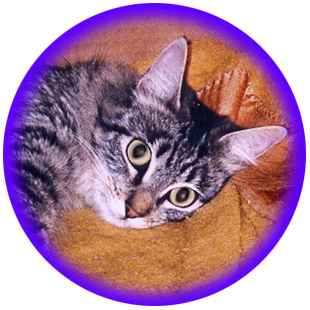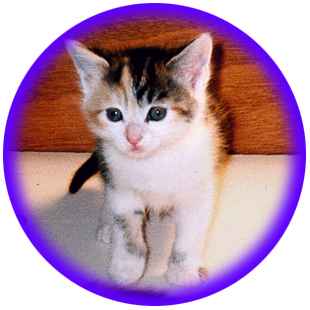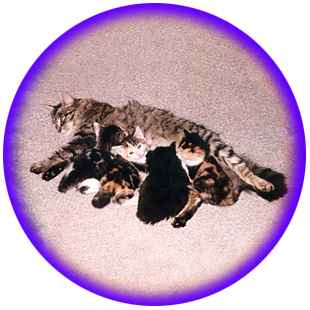 Intro -- BB Rose
Intro -- BB Rose
Midsummer, I adopted a half starved, pregnant stray, and gave her the name BB Rose.
Her kittens were born on Friday the 13th of August, 1999, giving me an excellent opportunity to
observe development in cats.
Watching their unique personalities emerge raises the old nature vs.
nurture question. While this isn't a controlled experiment designed to arrive at
conclusions accurate plus or minus 5%, one thing which seems true is that for kittens there is
a genetic component to personality, that is, they are not born tabula rasa. Or perhaps it's
karma carried from a previous life. Either way, they do come prepackaged with something.
 Alexander
Alexander
Alexander was named for
Alexander the Great. From birth he seemed to be the leader -- the biggest, and boldest, with a calm
air of assurance one might associate with a natural leader.
However, after about four weeks things
changed, and if I were to give him a handle now it would more likely be Marcus Aurelius. It may be
that his three sisters simply caught up (nature) or it may be the trials of living with three sisters
(nurture(?!)). Whatever it was, Alexander is less bold, but still retains a quiet, at times almost
reflective, calm. Of course, if a sibling's tail happens to pass near his mouth... well, some things
are irresistable to any kitten.
 Buster
Buster
What's to say. From early on Buster
was a Buster, quite likely to be the one to initiate a playful scrap.
However, after four weeks (this seems to be a pivotal point) she began to take on more of the qualities that
Fidel was named for -- much more demonstratively affectionate.
 Fidel
Fidel
Fidel is named from the latin for 'faithful', not the Cuban dictator. As it turns out, she's actually a Fidelia,
but since she's also a spirited scrapper like her sister Buster, its difficult not to think of her as a
'cute little guy' -- both Buster and Fidel are so darn butch. Fidel was the first kitten to seem to regard
me as a likeable entity, coming out of the box that was their den when she heard my voice.
She was also the first to purr while I stroked her.
 Buster & Fidel
Buster & Fidel
The way they've developed, Buster and Fidel make a strong argument for the genetic basis of personality.
During their heats, cats can be impregnated by more than one father, and due to the physical
similarities between these Calico Sisters, it's likely that they have the same father. While Buster
didn't initially show Fidel's demonstrative affection, she's certainly caught up in that regard by six
weeks, not infrequently scaling my leg for a cuddle, with those tiny little claws they have (thank
goodness it isn't shorts season!). Now they are like two peas in a pod (peas with the same combination
of dominant and recessive genes, for any Mendelians reading this).
 Nuit
Nuit
Nuit was named from the French for 'night', for obvious physical reasons, though depending on
how you feel about night it might reflect her personality as well. She is the most shy of the
kittens and has been from the start. She is generally quiet, soft and black and developing the
kind of fluffy coat that suggests her father had a good measure of Persian blood in him.
And the shyness is most strongly expressed towards human strangers, with the exception of my friend
Gary who is adopting her. She'll tussle with the rest of kittens,
and has never had any trouble finding a spot at the dairy bar.
 Conclusion
Conclusion
The personalities of Fidel and Nuit seem to have remained relatively consistent from birth,
whereas both Alexander and Buster evidenced changes in personality after the fourth week.
To the extent that environment plays at least some role, I have adopted a somewhat
Rogerian approach to raising them, lots of unconditional positive regard and all that (though
if their mother feels that one of them requires a bath she tends to be somewhat more
interventionist). Buster and Fidel are especially interesting with their most common genetic
background, and the fact that they are now so similar. The only puzzling bit is why early on
was Fidel so affectionate and Buster not? Did Buster become that way due to a genetic
predisposition shared with Fidel, or was it in response to being raised in a loving environment?
|